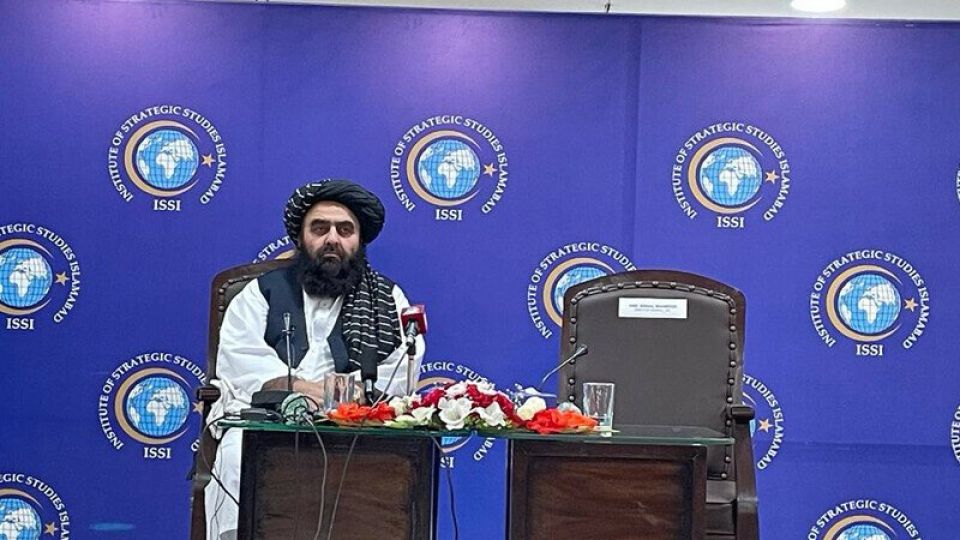May 9, 2023
ISLAMABAD – Acting Afghan Foreign Minister Amir Khan Muttaqi called on Monday for Islamabad and the outlawed Tehreek-i-Taliban Pakistan (TTP) to hold negotiations as a means to resolve issues faced by Pakistan pertaining to the banned outfit.
Muttaqi, who is on a four-day visit to Pakistan, expressed these views on the last day of his tour while delivering a talk at the Institute of Strategic Studies Islamabad (ISSI).
“As for Pakistan’s security concerns, we ask that the government of Pakistan and the TTP sit together and find a solution to these problems on their own.
“We hope […] that the problem would be resolved,” he said, answering multiple questions regarding the TTP, which is seen as one of the main perpetrators of recent terror attacks in Pakistan.
Last month, Pakistan’s military and civil leadership concluded during a meeting of the National Security Committee — which acts as the country’s principal decision-making body on national security matters — that the recent wave of terrorism in Pakistan was a result of “the soft corner and the absence of a well-thought-out policy against the banned Tehreek-i-Taliban Pakistan”.
In recent months, Pakistan has been hit by a wave of terrorism, mostly in Khyber Pakhtunkhwa and Balochistan. This surge in terror attacks was seen after Kabul-hosted talks between the TTP and the Pakistan government collapsed, resulting in an end to the ceasefire among them in November last year and the outlawed group ordering its militants to stage attacks across the country.
Islamabad says that the TTP — which has ideological linkages with the Afghan Taliban — has been using the Afghan soil for attacks in Pakistan, but the administration in Kabul has denied that the militant group is operating outside of Afghanistan.
In line with his government’s stance, Muttaqi, too, denied today that the TTP was using Afghan soil.
During his talk at the ISSI, which focused on explaining and defending the Afghan government’s policies, Muttaqi said, “The Islamic Emirate has fulfilled its responsibility. The IEA (Islamic Emirate of Afghanistan) was able to bring both sides to the table. We hosted the talks between Pakistan and the TTP.”
In an apparent bid to absolve the Afghan Taliban — which came to power in Kabul in 2021— from any responsibility regarding the TTP, he further argued that the TTP was not a recent “movement launched two years ago but an old group established [many] years ago”.
“Pakistan has admitted that nearly 80,000 Pakistani nationals have embraced martyrdom over the past 20 years and hundreds of thousands have been displaced. This is an old issue,” he said.
However, Muttaqi also gave the assurance that his government was making efforts for ensuring peace in the region.
“We have always tried our best for peace. We will continue our efforts. We do not want the flames of war in our neighbouring country, Pakistan. There should be no bloodshed in Pakistan. This is our official policy,” he asserted.
Sharing details about his latest visit to Pakistan, he said Islamabad and the Afghan side had discussed ways to make progress on security issues.
“We have talked to Pakistani officials about this issue. We will keep on talking to Pakistan. It will be our request that problems should be resolved through diplomatic channels and negotiations. There are hopes that the situation will further improve in the future,” he said.
While in Pakistan, Muttaqi also participated in the 5th Trilateral Foreign Ministers Dialogue with his Pakistan and Chinese counterparts, Bilawal Bhutto-Zardari and Qin Gang.
Speaking about the trilateral talks today, Muttaqi said all three sides had agreed that “no country will allow its ground and airspace to be used against each other”.
Trade with Pakistan
On the trade front, Muttaqi said Pakistan and Afghanistan had agreed to increase their bilateral trade up to $3 billion dollar from the present figure of nearly $1.1bn.
“When it comes to Pakistan, our initial focus was on economic ties, with connectivity, trade, and transit at the core of this outreach. There was significant regional interest in economically connecting Central Asia, via Afghanistan, to South Asia and beyond,” he said.
Muttaqi added that during the brief tenure of the Afghan Taliban government in Kabul, bilateral trade between Afghanistan and Pakistan had reached historical levels.
“If we continue on this path, not only Afghanistan and Pakistan, but the entire region will reap the rewards of our cooperation,” he added.
Replying to questions about the ban on education for women and girls in Afghanistan, Muttaqi maintained that the restriction was not permanent but would remain in place until the government’s next orders.


